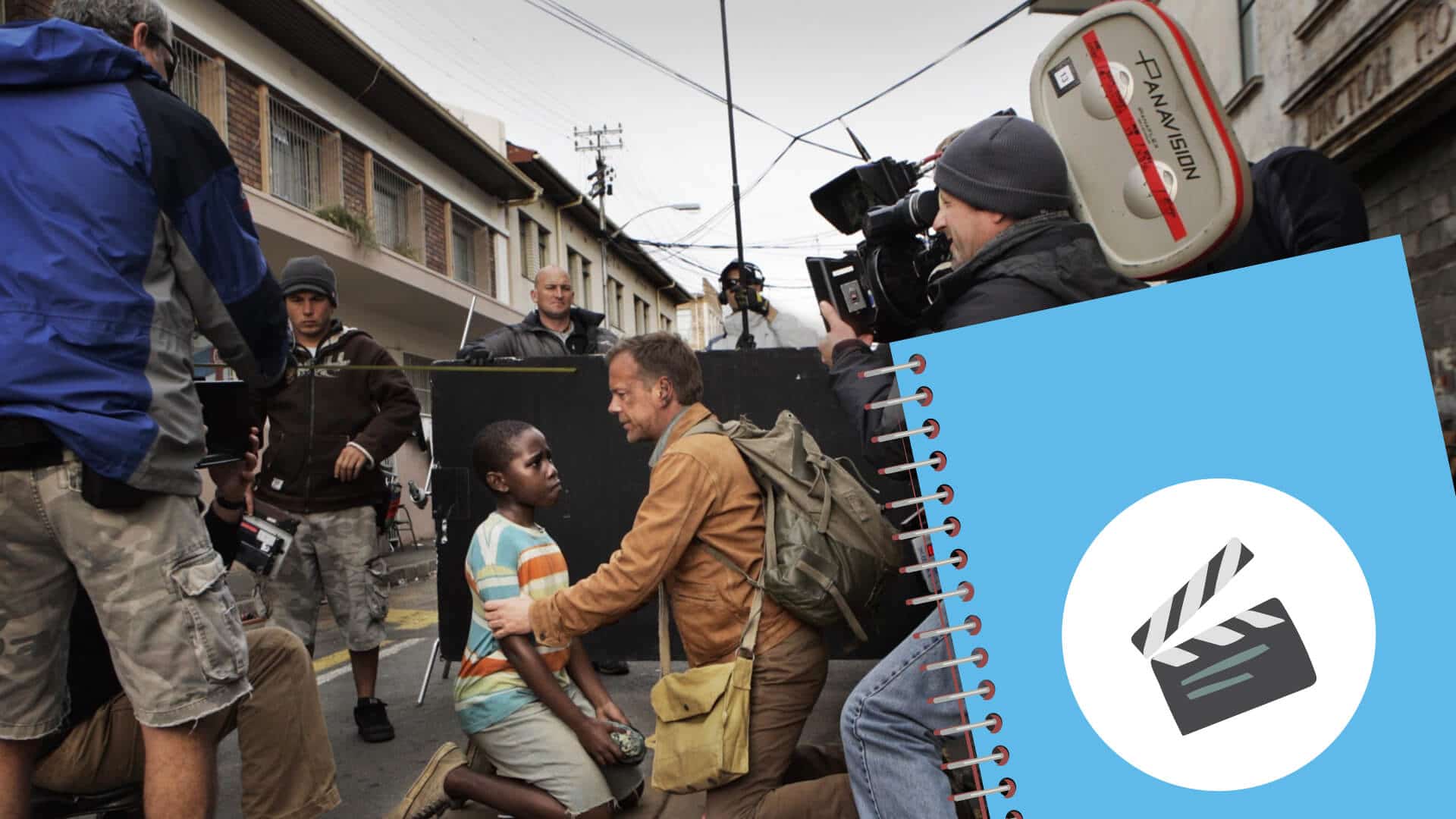Production assistants are integral to a shoot whether it’s for a film, TV show, music video, or commercial, but it’s hard to learn an entry-level job when you can’t get your foot in the door. You may be looking to book your first PA gig, or you’ve already had a few production assistant jobs but you haven’t been able to get steady production work. In this post, we’ve created a handbook with the production assistant job description and duties, and we’ll take you through everything a PA needs to know during their time on set, in the office, and in the editing suite.
Production Assistant Duties
Various Production Assistant Jobs
There are many types of production assistants. Additionally, each department on a film or television set can have its own PAs. However, PA’s are generally broken down into three different categories:
- Set PA
- Office PA
- Post-Production PA
On set, there will often be a Lead PA (Key PA). These are more than likely PA’s who have been working for a while with the production team or have a good amount of previous experience on similar or larger sets.
Lead PA’s may be tasked with coordinating production assistants with less experience, and may even hire the PA's for the remaining work days.
There also may be a 2nd-2nd AD, which is sort of like a PA who has sort of evolved into an AD… like a Pokemon or Super Shredder.
Did You Know?
One of Quentin Tarantino's earliest gigs was as a production assistant on a Dolph Lundgren workout video.
You also have Truck PAs, which are production assistants who’ve been tasked with driving a production cube (truck) to set.
Production cubes have their own set of rules, and you’ll want to familiarize yourself with tie-downs, walkie storage, and the freeway system near you because sometimes trucks are not allowed on certain freeway passages due to traffic/clearance concerns.
If you’re driving a production cube, and you get a traffic ticket for going on a restricted freeway, production will NOT pay for the ticket.
You may be picking up the camera on a day prior to the set day, and in this case you will often need to wait around a camera house for the insurance and payment to clear. Then you load the very expensive camera and lenses onto the truck and store them so they are protected.
You may be sent to pick up a dolly and dolly track as well, and these pieces of equipment are extremely heavy and will require you to use the truck’s lift-gate, controlled via wired remote on the rear of the truck.
DO NOT roll a dolly off the truck with the lift-gate down, or push the dolly, or the track weights too far forward. If you do this, and it slides off the edge of the lift-gate, immediately let go and scream “MOVE.”
If you don’t let go of the dolly, you will be flung from the platform like a pancake, and in less than a second you will DIE… I’m not joking. Still want to learn the production assistant duties? Great!
FREE DOWNLOADABLE BONUS
Download FREE Production Assistant Duties Checklist
Download our FREE, printable production assistant guideline PDF to ensure you hit the ground running. (includes bonus content not in the post).
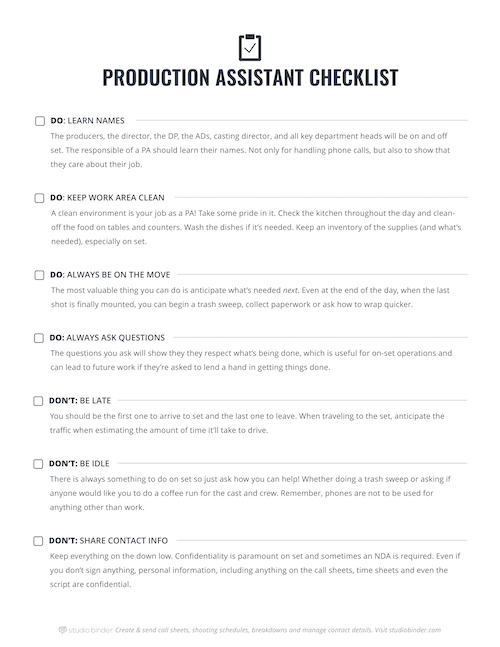


WHAT IS A PA IN FILM?
What is a Set Production Assistant?
A set PA, or field PA, supports the physical production. A set PA’s duties can change each day, but in general, they're support staff for the on-set team — carrying out tasks for the production team first and foremost.
Set production assistant duties often include:
- Transporting equipment
- Driving talent and crew
- Supporting crew members on set
- Preparing and packing items
- Handling production paperwork
- Protecting the set from the public (lock down)
- Cleaning the set and emptying trash cans
FILM PRODUCTION ASSISTANT JOBS
Office production assistants
An office PA is an entry-level position in the production office of a film, television show or commercial. An office PA supports a film’s production from a clerical standpoint — handling paperwork, phone call inquiries, and picking-up or dropping-off items. Office PA’s are also commonly involved in supporting a production’s writer’s room.
Office production assistant duties often include:
- Handling phones
- Maintaining craft services and kitchen area
- Spinning off script sides
- Going on supply runs
- Calling locations and vendors
POST-PRODUCTION ASSISTANT JOB DESCRIPTION
Post-Production Assistants
A post-production assistant is an entry-level position in the post-production office of a film, television show or commercial.
The post PA supports a film’s post-production operations by supporting editors and post-production producers by helping to make sure editing operations are smooth and organized.
Post-production assistant duties often include:
- Organizing and grouping footage
- Keeping the edit bays organized
- Managing hard drives (no magnets)
- Scrubbing through footage
- Supporting post-production staff
- Going on supply runs
WHAT DO PRODUCTION ASSISTANTS DO?
Considerations for a being a Set PA
If you’re a set PA, this means your main job is to support the production department (unit production manager, production coordinator, lead PA, 1st AD, 2nd AD, 2nd-2nd AD, and Producers).
Your job is to support them, and their job is to keep the set safe and secure, to make sure union and employment guidelines are adhered to, and to ensure the production stays on track so everyone leaves on time.
There will be times where the wardrobe and make-up department will ask you to carry their clothes and wardrobe racks to their car, or make-up will ask you to carry something, or maybe even crafty.
You can help them out, but remember that your job is to support the production team. And while everything is technically part of the production, if the AD or production manager asks you to do something urgent and you're helping a department that may already have their own PA, you might have to bail on them to go on a supply run.
Related Posts
WHAT DOES A PA DO?
What should you bring to set?
You’ve just been hired as a set PA. Nice job! You’ve got gas in your car, right? You’re prepared to eat your own personal breakfast in the morning, right? And you’re ready to arrive fifteen minutes early, right?
The chance that you’ll be carrying ladders, dirtying your clothes, and handling trash bags is pretty high, so don’t bust out the dancing shoes.
Often, sets will be on outdoor ranches or in areas with oil spots. It may rain, or snow, or be windy, or the production is faking all three, so your clothing should be able to deal with inclement weather and conditions.
Here’s what you absolutely need to bring:
TENNIS SHOES OR HIKING SHOES
I’d suggest your old pair of shoes rather than your mint condition Air Force 1s. Hiking shoes are good for outdoors, but also good because they have a stronger toe than say a pair of Vans.
TEE SHIRT & WEATHER PROOF JACKET
You’ll often see PA’s, grips, and other production crew wearing ‘crew shirts’ from previous productions, and they are always tee shirts, predominantly black, and act as a reminder of a crew member’s experience. You may not have one, but try to emulate this style.
CARGO SHORTS OR WORK PANTS
Cargo shorts are great because you have extra pockets and will allow you to carry things securely in those pockets. They’re also durable, and good in hot weather. Similarly, work denim and cargo pants are a good idea for the colder days. Bring a belt as well so you can hang your walkie.
BACK UP CLOTHING
It may rain or be muddy on the outdoor set. This is way more likely than a normal day job, so bring something just in case. It’s better to have it, and not need it rather than need it, and not have it.
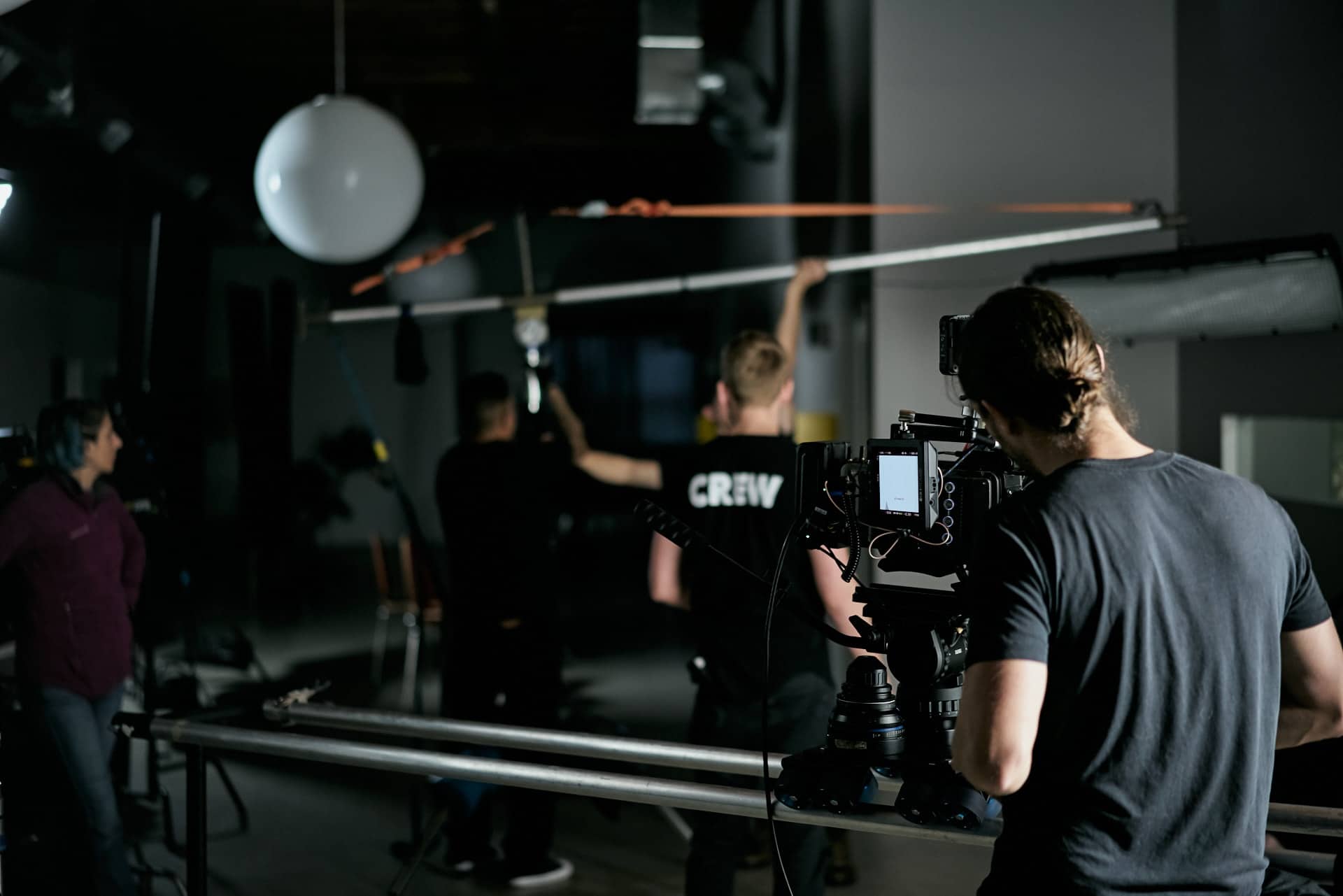

What to wear on set: casual and functional
PHONE CHARGER & BACK PACK
We live in the digital age, so your phone will be one of the most important things on set — especially as a PA. Make sure to keep it on vibrate so that it doesn’t ruin a take. If the battery dies… that’s not good.
PEN AND NOTEBOOK
If you’re the PA who will be going on runs, taking coffee orders, or maybe even lunch orders, you will need to have a pen and notebook. If you bring your own from home, production will be impressed.
LIGHTER & CIGARETTES
We know… why would we promote smoking? We don’t, but people smoke on set, and it’s a great icebreaker. You might make connections or have opportunities to chat with folks because you have these things.
MULTI-TOOL & ZIP TIES
A multi-tool is like a Swiss Army knife on steroids, and they are great for quick fixes and can help you stand out from the other PAs. Zip ties are great for the same reasons, and while they’re less necessary than the multi-tool, they will come in handy more often than you might think.


Example of a multi-tool for PA jobs
WALKIE TALKIE EARPIECE (SURVEILLANCE)
On professional sets, these will be provided with the walkie set that the production rents from an equipment rental house, but some sets may not have the budget for a professional walkie set rental.
SUNSCREEN, SUN HAT, & SUNGLASSES
Set days can go anywhere from 8 to 20 hours. This sounds like a joke, but it’s absolutely true, and if you’re in the sun for an extended period you will not only burn, but you won’t be able to perform your duties the next day.
WHAT DOES A PRODUCTION ASSISTANT DO?
Learn the anatomy of a call sheet
Call sheets will be sent to you the night before the shoot, and this document will have every piece of important information present, so study the call sheet and find your call time (when you report to work).
Call sheet essentials
Also, there will be at least two addresses on the call sheet:
- Set location address
- Nearby hospital address
- Production office (possibly)
If you don’t study the call sheet, and you arrive fifteen minutes early to the nearby hospital, you’ll be pretty disappointed in yourself.
Arrive fifteen minutes early to the production office, and there is a 90% chance you won’t make it to set… which increases your chance of being asked to not come to set at all. It’s not personal… it’s business.
Call sheets will often have information about the days events as well, so see what you can learn about the next day from your call sheet.
What Does a Movie PA Do?
Learn on-set walkie talkie lingo
Walkie talkies are the most important tool you’ll use on set because they’re used to communicate quickly and expedite tasks. Walkie talkies have multiple channels, and often each department will have its own dedicated channel.
Here are the common assignments:
- Ch. 1 — Production (You)
- Ch. 2/4/5 — Open, for one-on-one conversation
- Ch. 3 — Transportation
- Ch. 6 — Camera
- Ch. 7 — Electric
- Ch. 8 — Grip
There are even situations where multiple crews are nearby one another, like say on the backlot, so make sure the frequencies aren’t mixing.
Sound mixers will also need to keep this in mind, since their lav mics can often mix in with walkie talkies. This is super ‘in the weeds’ but it’s the type of knowledge that is good to keep in mind just in case.
A quick guide to walkie talkie lingo
You always want to keep extra walkie batteries on you at all times, these are known as “hot bricks.” You also will want to lock the set down while shooting, even crew shouldn’t be walking on and off set.
Additionally, the terminology used on the walkies can often be used off walkies, so you can use many of these film terms whenever appropriate.
Here’s some of the lingo: Let’s say your name is BILL. If you need to talk to someone, say, “BILL for TED.” There may be times where there are multiple people with the same name so use a last initial, crew position, or nickname (e.g., TED L.).
If someone calls you on the walkie, say, “Go for BILL.” Don’t say, “Yeah” or “What’s up?” or “BILL here.” There may be times where you need to move to an open channel to discuss something more complex or list off coffee orders to another PA.
If you need to go to another channel, say, “TED go to TWO.” This means you will both go to channel two on your walkies, but if you find someone else already on the channel, then either go back to ONE (hopefully TED will do the same) and move to a different open channel.


"Bill for Ted" • "Go for Ted"
When you need to confirm that you understand information, say, “COPY THAT.” This extends beyond just the walkies, so use this term all the time. If you need to confirm that you’re carrying out a task, say, “ON IT.”
This will limit redundancies, and if it’s something you anticipated it will show initiative. However, don’t try to snake tasks from others in an attempt to impress because it will backfire and you’ll look silly.
If you didn’t hear information over the walkie, say, “GO AGAIN PLEASE.” Walkies don’t always work perfectly. Sometimes extras are being loud. Don’t be embarrassed to ask for clarification, they will understand.
If you already have a task, or need extra time, say, “STAND BY.” This will let the production know that you heard the call, but that you’re currently busy with something that will be done soon.
When you’re asking someone where they are, say, “WHAT’S YOUR 20?” This will let you know where someone is, but often someone will be asking you this question, so make sure to keep your answer brief.
If you’re about to leave the set, or turn off your walkie, say, “GOING OFF WALKIE.” This is so that the crew knows you will be unavailable for the moment. When you’re bringing something to set, like a ladder, say, “FLYING IN.” This will let the crew know that you’re on your way, either with an item, or because they asked for a PA to get rid of something.
When you need to find something or someone, say, “EYES ON ____.” Someone might ask if anyone has eyes on the ladder, and if you see the ladder in the production cube, you can say, “BILL’s got eyes on ladder.” This way they know who has eyes on what, and most likely “flying in.”
If information needs to get to everyone quickly, they say, “SPIN THAT PLEASE.” This is where something important has changed, or the crew needs everyone to understand something, so the information is sent out.
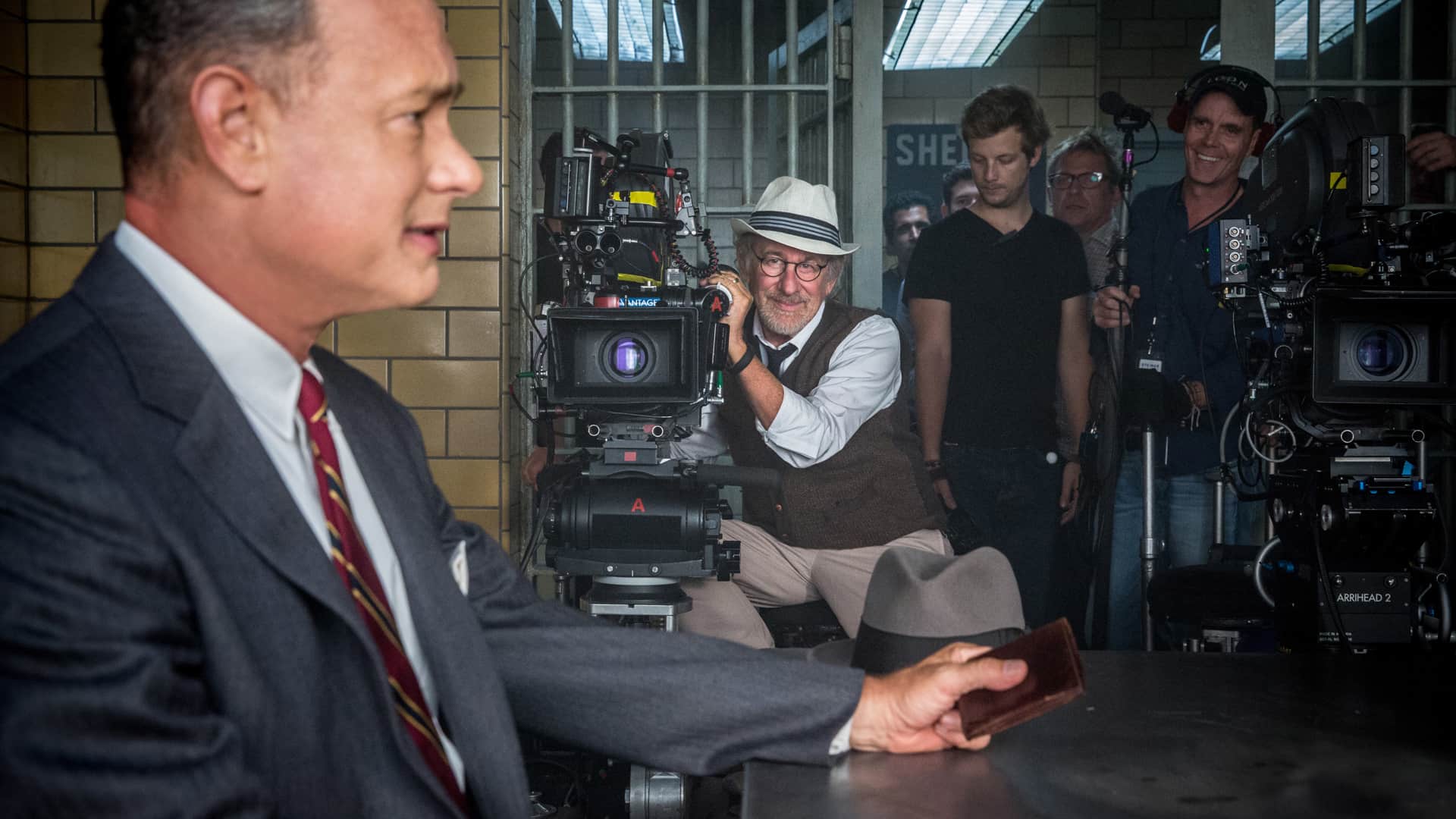

Film production assistant jobs
When you need to head to the restroom, or are already inside, say, “BILL is 10-1.” This will politely let the crew know that you’re unavailable, and that you’ll be back soon, whereas “going off walkie” can be for longer.
When the camera is rolling, everyone on set needs to be quiet and the PAs will help out by calling out, “ROLLING.” This is so that people know to be quiet and not to walk on and off set.
If you want to learn even more about walkie talkie lingo, read our post that explains all of the walkie protocols you need to know on set.
Production Assistant Lingo
On-set vocabulary you should know
Let’s talk about some ON-SET LINGO you might hear:
“POINTS” — This is what you call out whenever you are carrying something near people, specifically turning corners, walking through doors, or walking onto set — don’t be shy to say this with conviction.
“LAST MAN” — Refers to the last person to get their food at lunch, which should really be you, and marks the time you mark on your time card for lunch time.
“BACK IN” — Lunch is now over and you will mark this time on your time card.
“VIDEO VILLAGE” — Where the production team (quite possibly you) will set out director’s chairs and monitors for a small group of filmmakers and producers to watch the footage as it’s recorded.
“HOLDING” — This is the term for the area that the background actors will stay until they’re invited to set. This is similar to a “waiting room.”
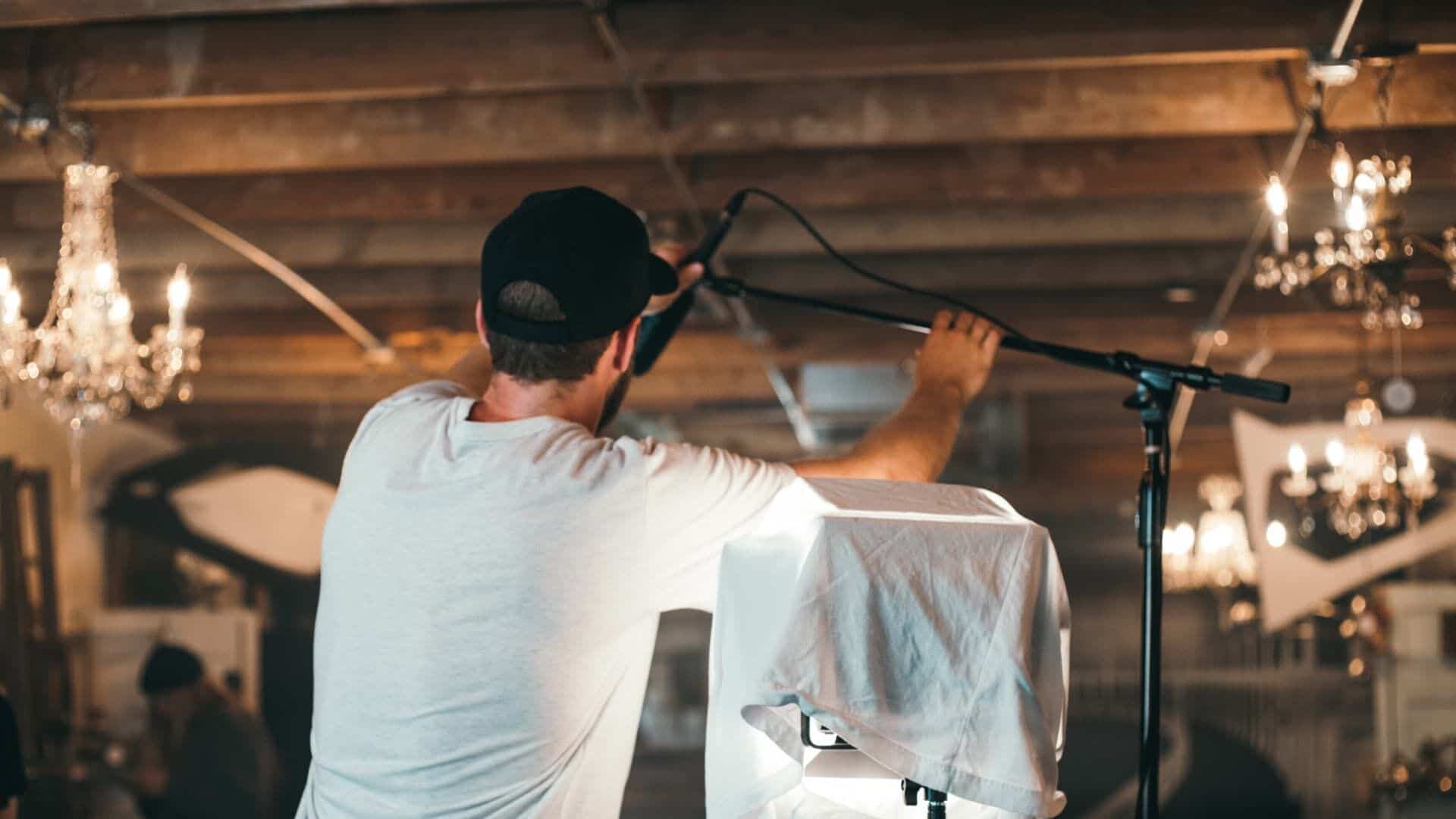

Production assistant duties
“STAGING” — The area where the grip, electric, and camera department will place their equipment so that it’s not on set, but really close to set so that it’s easily accessible.
“SIDES" — These are the pages that will be shot on the day, and most likely they will be printed out at half size and distributed to department heads and actors.
“STINGER” — This is the name for a heavy duty extension cable, and you may receive a few on your production cube, or need to get one from the grip truck.
“FURNIE PAD” — A term for a furniture blanket, which most productions will have a ton to dampen sound or cover important items.
“C-47” — This is the name for a clothespin, named after the versatile C-47 airplane during WWII. Possibly the lamest of all the film jargon.
“MARTINI” — The last shot of the day, but not necessarily the last take.
These are the most common on-set film terms. But if you want to go off the deep end with terminology across the entire film spectrum, we've got the ultimate film term glossary to complete your film vocabulary.
FILM PA DUTIES
How to do production supply runs
If you have a car (which is often a requirement for certain types of PAs) you will most likely be asked to go on some sort of supply run.
Here’s what you need to do:
- Ask for petty cash or a cache card
- NEVER pay for something out of your own pocket
- Enter the address in GPS and double check
- Don’t get lost and don’t dilly-dally
- Don’t rush or get a traffic ticket (production won’t pay for it)
- ALWAYS get receipts for the production
If you’re on your first few days, and the production asks you to pay for something out of your own pocket, stand your ground and politely let them know that you cannot do this.
Why would we tell you this?
Because production is often the Wild West, and while Disney Studios will promptly pay you, Ballz Out Productionz might not.
PAs often rely on various one-off paychecks to pay their rent and make a living, and there is nothing more frustrating for a PA than getting a check later than needed, or even worse… not getting it at all. Production assistant salary is nothing to brag about.
Producers aren’t con artists… but sometimes they are, so don’t accept responsibility for the production’s expenses.
Related Posts
How To Become A Production Assistant
How to prepare on-set mealtimes
As a PA, one of the most important duties when learning how to PA will be prepping and staging for meals — most likely lunch.
What you need to do:
- Set out folding chairs and tables
- Place trash cans in strategic areas
- Create signs to direct cast and crew to the area
- Be the last person to sit down and eat
Before you fit the trash bag to the can, make sure to leave a few extra bags underneath so that you can quickly re-apply a bag once too full.
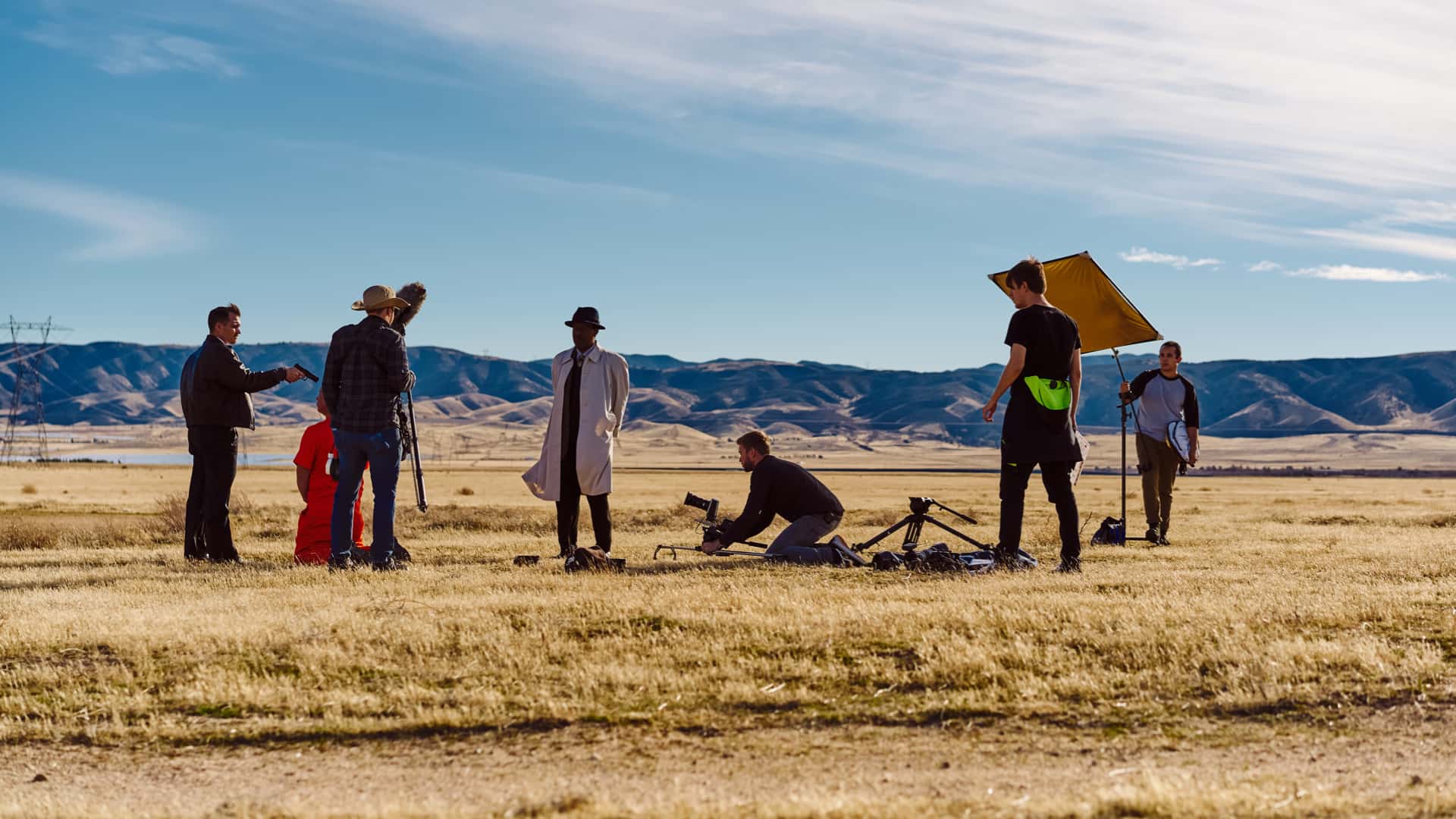

Production assistant duties
You want to be the last person because part of the production assistant job description is to make sure everyone has arrived and had a chance to eat. Sometimes this will be the cast and crew, but other times you’ll have a background actor who swears that “they’re not really hungry.”
You can’t force them to eat, but they are not allowed to sit in holding with all of the other background actor’s valuables, so politely let them know they don’t have to eat, but they must head to the lunch area.
Once you’ve confirmed (over the walkies and in person) that the entire cast and crew have sat down to eat, you may now safely make yourself a plate and sit down at a table, most likely with your team.
The director and DP will be eating together to discuss the second half of the day, so this isn’t your time to go up and ask them advice (there really won’t be a good time for this, but definitely not lunch).
Unfortunately, you’ll have to keep an eye on everything during lunch in case someone wanders off, but you’re not the security guard either. Just be mindful, be attentive, and eat healthily.
WHAT DOES A PA DO ON SET?
How to wrangle gear and clean set
Generally, you will only be touching production equipment like walkies, ladders, trash bags, and maybe the odd wardrobe rack, but there may be times where you have to head to the grip department to grab a stinger (large extension cable) or asked to help move some furniture.
You shouldn’t touch equipment that isn’t part of your department, so if you see a light stand that’s in the shot, tell a grip. If you notice a $15,000 lens sitting on top of a storage box… tell the camera assistant.
One thing that is always a point of confusion is gaff tape — the sooner you understand what the different colors are, the less likely you'll make a rookie mistake and clean up tape that was meant to stay. Let this video walk you through the wonderful world of gaffer's tape.
Tape: an essential part of PA duties
If an actor is eating crafty and their lipstick is smudged, take them back to hair and make-up. You may have the best of intentions, believe that time is of the essence, and just want to help the production, but there are union rules that keep people in their specific lanes for good reason.
Now, maintenance can mean a lot of things, one of which is clean up for the set, which often means discarding and replacing trash bags. Here is something you want to keep in mind with trash and production:
- Productions generate a large amount of trash
- Productions are responsible for trash disposal
- You are NOT responsible for trash disposal
So, what does this mean? Does that mean the producer has to take out the garbage bags? No, of course not — that’s totally within the production assistant job description, but...
That doesn’t mean it’s your responsibility to store the garbage in your personal car and take it home to discard at your apartment. If you’re caught throwing garbage bags into someone else’s dumpster, you will get a $400 ticket at minimum… and the production won’t pay for it.
Some producers will ask for the trash to be loaded on the truck and driven back to the production office to be disposed of in the dumpsters, or they might tell you to dump the garbage at the production cube lot.
PRODUCTION ASSISTANT DUTIES
How to handle paperwork carefully
You may have to deal with time cards, call sheet distribution, script sides, DPRs or DOODs, and it’s important to be as responsible as possible with these essential production documents.
Many of these documents have important information like social security numbers and identification information, and if something goes wrong or suspicious activity is reported they will ask the PA's first.
The 2nd AD, and 2nd-2nd AD will check the paperwork before releasing anyone for the day, but it is often within the production assistant job description to locate any stragglers who have incomplete paperwork.
If the crew is still shooting, don’t run onto set with the paperwork and ask them to fill it out. If they’re wrapping the set, politely let them know they have a few missing sections, and they’ll come over when they can.
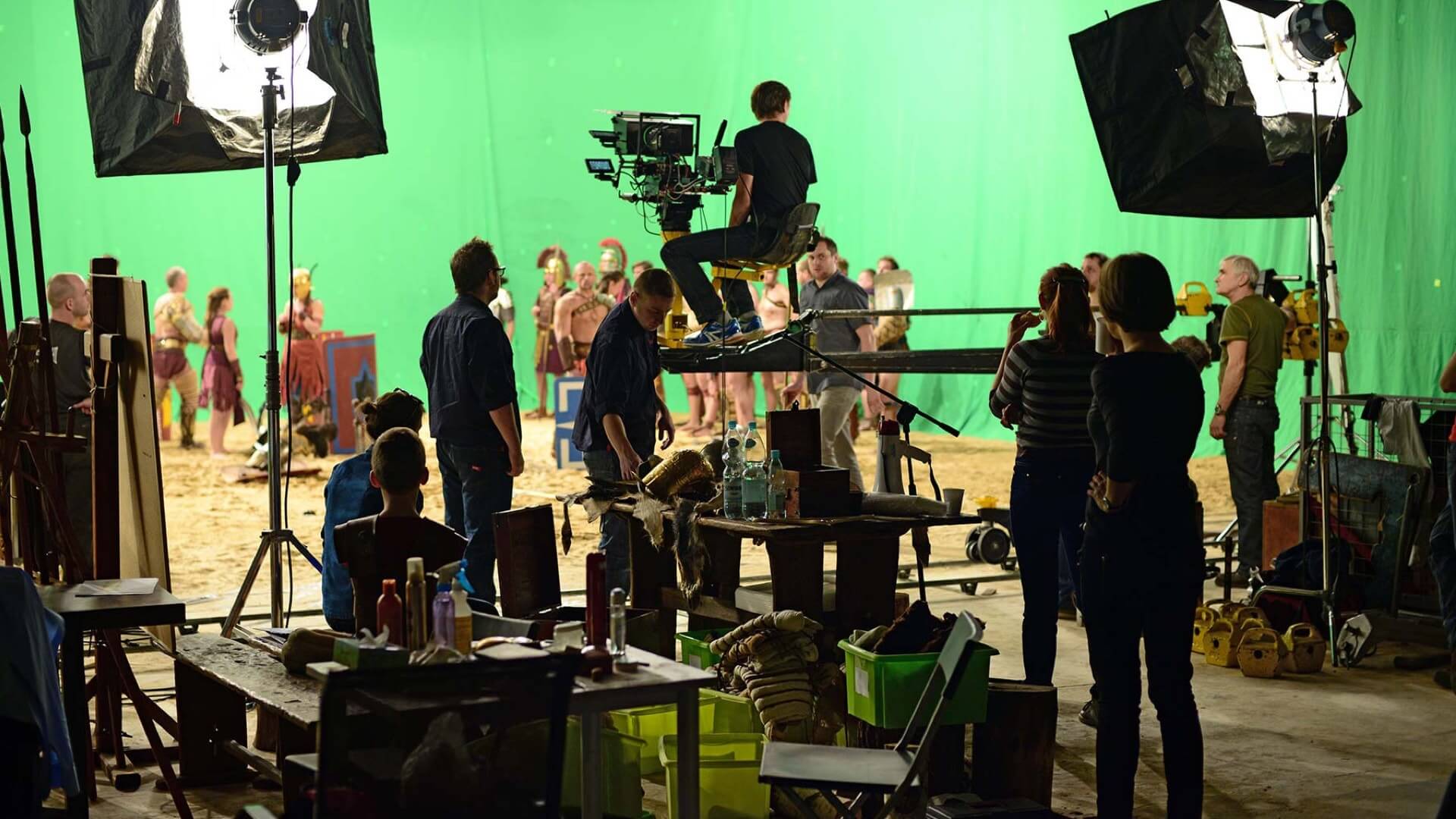

What does a production assistant do?
What happens if someone asks you for information like a cast member’s email address or the director’s phone number? If it’s someone senior like the DP or Key Grip, just let them know that it’s above your pay grade and send the request up the ladder.
If a background actor or crew member asks for this info, politely let them know that you cannot accommodate their request. The production team’s number one priority is safety, and that extends to information, financial or personal, as well as physical safety.
PRODUCTION ASSISTANT DELIVERABLES
Safely transport deliverables
Here’s a fun little nightmare scenario:
The DIT hands in the hard drive with the day’s footage. A producer hands them to a PA to deliver them so the footage can be stored. The PA stops to pick up a bag of magnets for the Art Department and lays them right on top of the hard drive. An hour later, the person tasked with uploading the footage calls to say the hard drives are blank.
Aww shucks! Now, who’s to blame? Does it really matter?
The footage is gone… possibly forever, and everyone now has a ‘classic production blunder’ story they can tell other crews, where tens of thousands of dollars of footage was literally wiped because there was a failure to communicate.
Everything needs to be organized when transporting valuable materials, even receipts, and you will rise quickly if the producer asks you to deliver something important and you bust out a clever storage container.
FREE DOWNLOADABLE BONUS
Download FREE Production Assistant Duties Checklist
Download our FREE, printable production assistant guideline PDF to ensure you hit the ground running. (includes bonus content not in the post).



How To Movie PA
Great PAs do these things on set
We’ve gone over the production assistant job description and duties, but now let’s talk about a few of the things you can do to impress and show you’re ready to be part of the production team going forward.
Producers, Production Coordinators, UPMs, Assistant Directors — all of these people have a contacts list with dozens of PA’s. When they book a job, they go right into their contacts list and they find the favorites on their ‘roster’ so that they bring the best crew with them.
Will you be remembered as "BILL — arrives early, always working, very dependable." Or will you be remembered as "BILL — talks too much, often sleepy, slow on supply runs." Here’s how to avoid being passed over for future PA jobs.
HOW TO MOVIE PA
Learn names and introduce yourself
A big PA responsibility is to learn the cast and crew’s names. If you’re part of a specific department, know their names at the very least.
If you’re the PA who escorts talent to and from set, you should learn the talent’s name, and in some cases Gene Hackman will prefer to be called Mr. Hackman versus, “Hey Gene, we’re ready for you!”
You should make it a point that they know your name too, so when the time comes for you to ‘invite them to set,’ you can knock on the dressing room door and say, “Valerie… this is Bill. Production would like to invite you to set,” and then wait patiently for Valerie to emerge.
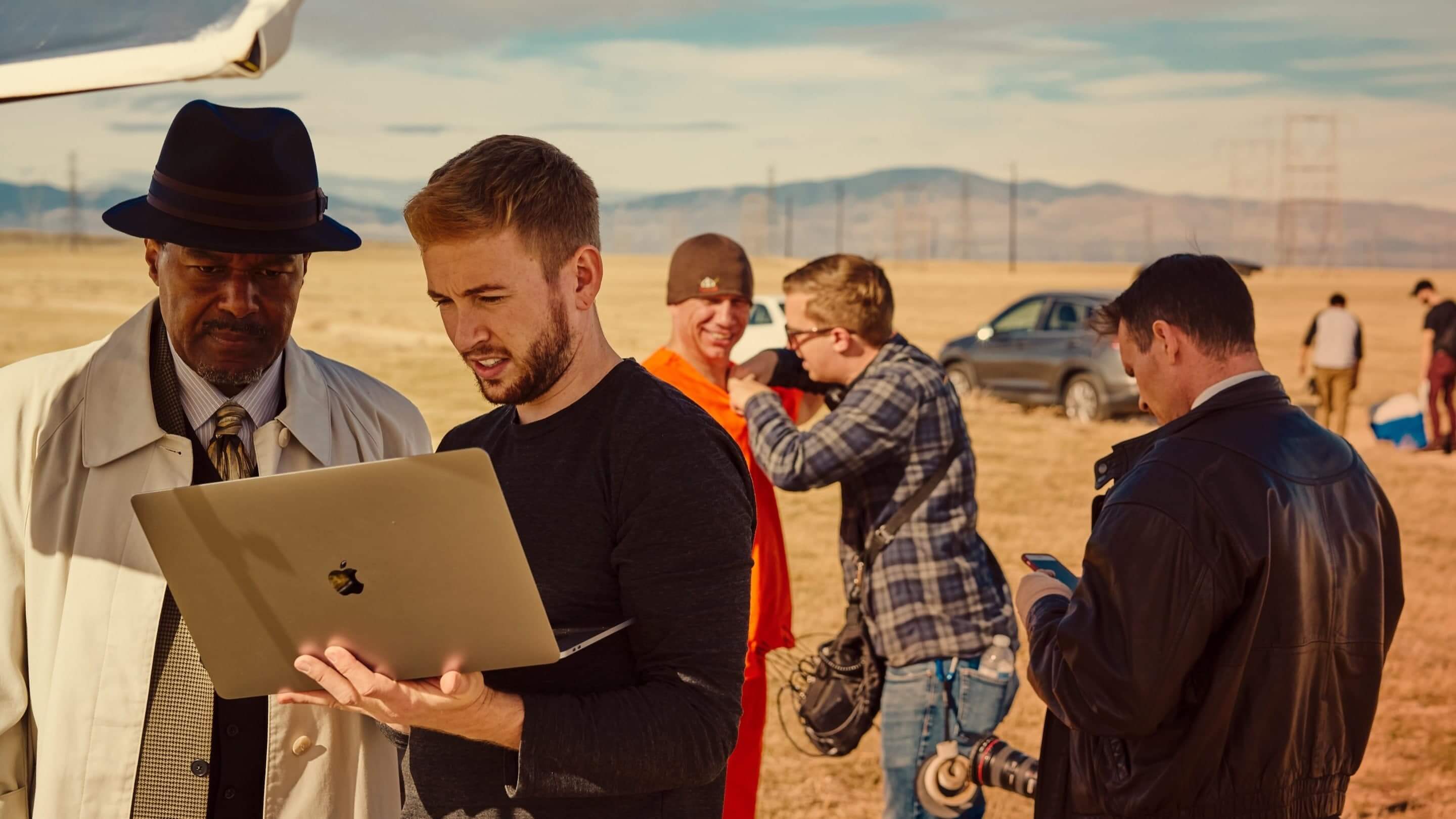

Film production assistant jobs
The fact of the matter is that being on camera is a somewhat terrifying affair, and they need someone to be on their side. More often than not, that person is you, and part of the production assistant job description is to keep them thinking positively, and send them off with confidence.
HOW TO MOVIE PA
Keep the work area clean and stocked
Part of the the production assistant job description is to keep things organized, and while you’ll never touch light stands and camera equipment, you can absolutely clean up the crafty table, throw away trash, and restock drinks.
One of the biggest wastes on film sets are plastic water bottles, the scourge of the environment. Every production will have about a dozen cases or 24-pack water bottles, which means 200 plus plastic water bottles that will be opened, sipped from, and left half full.
That is a lot of wasted water, and a lot of wasted plastic. This is why many productions will buy reusable water bottles for cast and crew and use the water cooler method to make the production more green.
If you’re the PA in the office, push for this option as early as possible because it saves both money and the environment, and if the water bottles are personalized you get a nice little memento from the project. Regardless of the water bottle situation, make sure to replace the trash before it gets super heavy because it will be difficult to carry out.
HOW TO SET PA
Never sit down on set or be idle
On a film set, the crew never sit down. Chairs would get in the way, apple boxes are for more important things, and there’s no reason to sit down.
If a producer sees a PA sitting on set, they will remember, and they will say something. As a PA, you don’t have to be the Tasmanian devil running around, but you cannot be the 'chill dude' on the phone either.
“How can I help the team wrap early?” If you’re thinking this question throughout the day, you will be a better PA and every person on set will thank you for it, including yourself.
FILM PA JOB DUTIES
Be early and be confident
One of the production assistant duties might include being the first person to arrive on set along with a production coordinator or UPM, and this is because you need to prepare for everyone else.
Be fifteen minutes early, because the producers will be there at this point too, and it will show your professionalism. You can then safely grab some coffee (maybe breakfast) and then begin unloading the truck, moving things out of the way, clearing paths, opening up bathrooms, cleaning dressing rooms, setting up areas for staging.
It will be you and the other PAs who will set the tone for the day, and that is some serious power in your hands. Don’t waste it, but rather create a perfect situation that guides everyone exactly where they need to be.
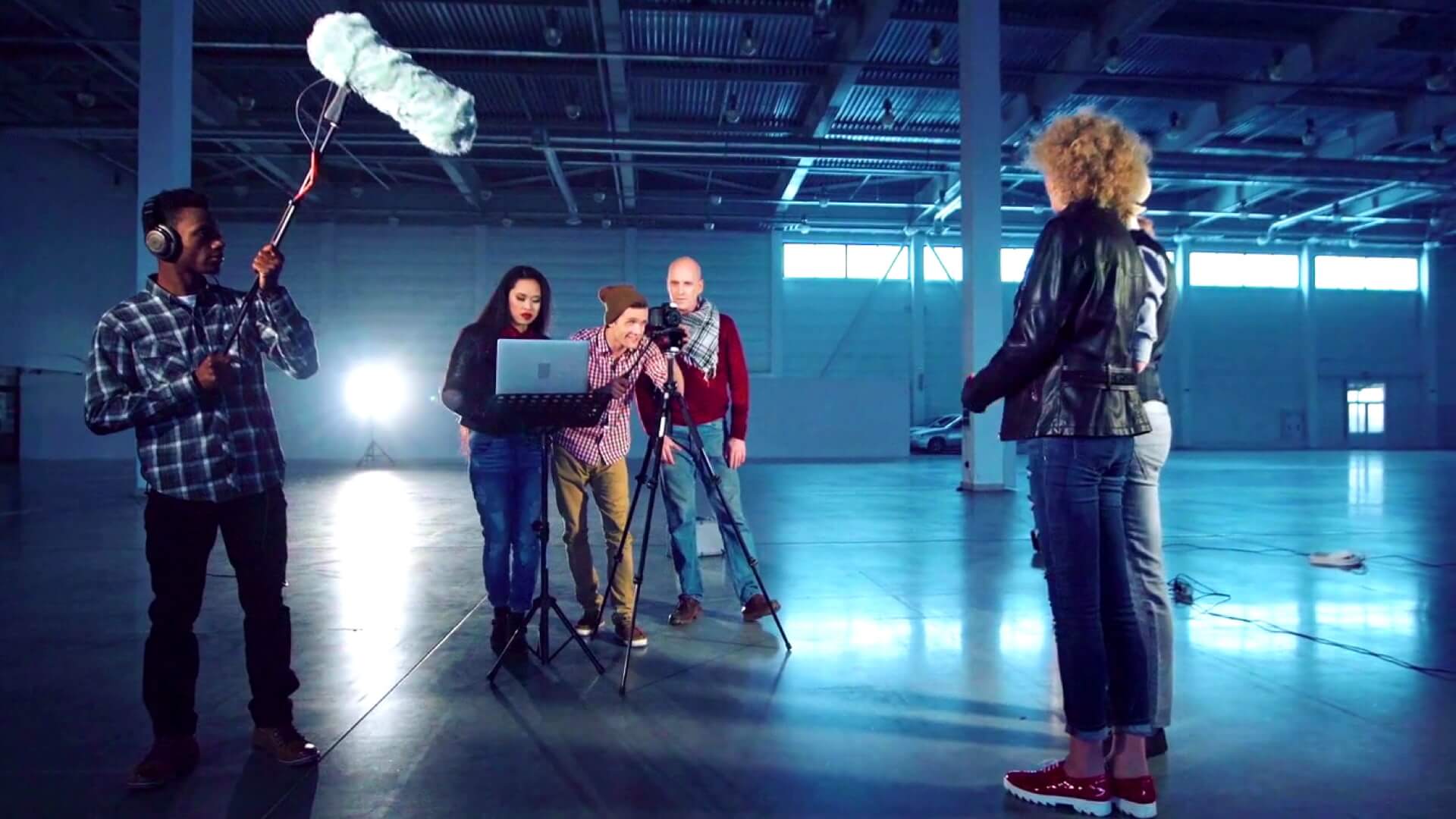

How to keep the production assistant jobs coming
Be confident in your abilities, and your decisions, especially at the beginning of the day. You’re in charge for this brief window of time, so if a grip parks a truck where it shouldn't be, chat a bit and let them know the plan, and if they become defensive, coordinate over the walkies.
Many of the crew you will work with will be ex-military and hard workers, so they may seem grumpy and unapproachable, but they’re just focused on their job as much as you are — so make a friend. Introduce yourself, let them know you’re here for them, and work hard. They will appreciate this and help you when the time comes.
WHAT IS A PRODUCTION ASSISTANT
Avoid advice and creative questions
You might have some really good ideas for a number of things, both creative and logistical, and that’s why you own a journal. You can write these ideas down and keep them for your own projects in the future, or use them to build a resume for becoming an associate producer.
What you should avoid is giving advice or making suggestions on set, especially creative ones. Film sets are comprised of people who have paid their dues, and worked their way up the ranks — and even if they got there through sheer luck, they will be offended by your input.
FREE DOWNLOADABLE BONUS
FREE TV Show Bible Template
Pitch your TV series more effectively with our FREE TV Show Bible template. Enter your email address and receive it instantly.
Up next:
PA job boards, salary, and resume
So now you know the production assistant job description and duties, but just because you can answer, “What does a PA do?” does that really mean you’ll be able to find production assistant jobs? If you want to find PA work, this article will show you the best places to find PA work.
